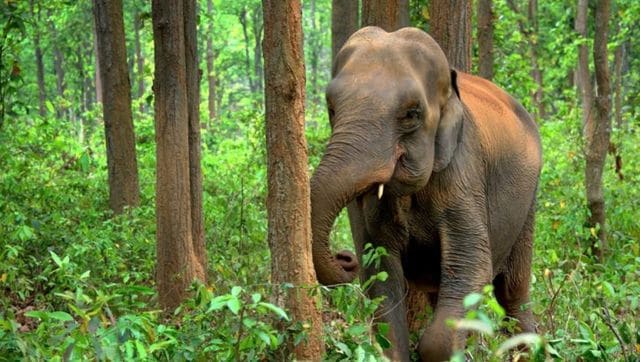An elephant may never forget, but when it comes to Chandratara, two nations certainly won’t let her story fade either.
This majestic elephant, who wandered through dense jungles, now finds herself at the heart of a heated tug-of-war between India and Bangladesh. The dispute centres around a cross-border ownership claim that has drawn attention on both sides of the border.
Atikur Rahman, a Bangladeshi citizen, asserts that Chandratara belongs to him. However, his claim is being challenged by two Indians, who have come forward with similar assertions. The elephant’s fate now hangs in the balance as the matter awaits a hearing in a local court.
But how did Chandratara’s extraordinary journey lead to this point? Here’s what we know so far.
Chandratara’s story began when she reportedly wandered through the jungles in search of food and, unintentionally, crossed the border into Indian territory.
The elephant was discovered on 11 September last year near a border village close to western Kailashahar in Tripura’s Unakoti district. She had passed through an unsecured area, eventually being spotted by personnel from the Border Security Force (BSF).
Atikur Rahman, a Bangladeshi resident from Moulvibazar, claimed the elephant as his own, suggesting she had strayed into India out of confusion. However, the situation took a complicated turn when two Indian villagers also claimed ownership of Chandratara.
“After being informed by BSF that an elephant was roaming along the border, we rescued her. Immediately, two villagers claimed ownership, but weren’t able to give proof. We took the elephant into custody after that,” a senior Indian wildlife official told The Times of India.
Hearing this, Atikur acted swiftly. He sent photographs and ownership documents to the BSF and the Tripura Forest Department through his relatives, Sad Mia and Shimu Ahmed, who are Indian citizens.
Anticipating the legal challenges ahead, Atikur lodged a General Diary (GD) with the Kamalganj Police Station in Bangladesh. He also escalated the matter by filing a formal complaint with the Border Guard Bangladesh (BGB) headquarters.
Following Atikur Rahman’s complaint, a flag meeting was held between the Border Security Force (BSF) and the Border Guard Bangladesh (BGB). During the discussion, Atikur presented valid documents to support his ownership claim over Chandratara, reports The Assam Tribune.
However, due to legal complications and the elephant being in the custody of the Tripura Forest Department, the BSF was unable to facilitate her return to Bangladesh.
With no resolution achieved, the matter has now been taken to a court in Tripura’s Unakoti district, where the case is set to be heard on January 21. Saleh Ahmed, a relative of Atikur, has initiated legal proceedings on his behalf to seek the elephant’s return.
Currently, Chandratara is being housed at an elephant camp in Mungiakami, according to a senior wildlife official. “The elephant is safe,” the official told The Times of India.
For Atikur, life without Chandratara feels incomplete. He remains hopeful for a reunion with his beloved elephant.
“India is a great country, and I have immense respect for the law of this land,” Atikur said in a video message. “I trust the legal complexities will soon be resolved, and I will be reunited with my elephant.”
Also read:
What’s behind the deaths of 7 elephants in 2 days in Madhya Pradesh’s Bandhavgarh National Park?
The population of wild elephants in Bangladesh has dramatically declined in recent years, with the species now listed as critically endangered.
According to a BBC report, only about 200 elephants remain in the country, and nearly half of them are in captivity. Once a thriving habitat for Asian elephants, Bangladesh has witnessed a sharp decline in their numbers due to poaching and habitat loss.
In a significant move to protect these endangered animals, the Bangladesh High Court granted legal protections to the wild elephant population last year. The decision aims to prevent exploitation and ensure better conservation practices.
Previously, young elephants were often captured and licensed to logging companies, where they were used to haul timber. Some were even sold to circuses, enduring harsh conditions. The High Court deemed these practices illegal, highlighting violations of licensing terms and the unethical treatment of the animals.
Rakibul Haque Emil, head of the People for Animal Welfare (PAW) Foundation in Bangladesh, described the court’s decision as a “landmark order.”
“In the name of training elephants, private licensees, including circus parties, brutally separate elephant calves from their mothers, shackle them for months, and torture them to teach tricks,” Emil told the BBC.
He also expressed the foundation’s commitment to rehabilitating captive elephants.
“Several countries in Asia such as Thailand and Nepal have found some success in rehabilitating captive elephants,” he said. “We shall do it here.”
With input from agencies
Link to article –
A jumbo problem: Why India and Bangladesh are at loggerheads over an elephant?
